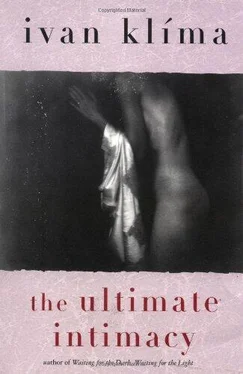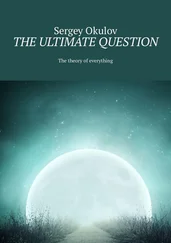Ivan Klima - The Ultimate Intimacy
Здесь есть возможность читать онлайн «Ivan Klima - The Ultimate Intimacy» весь текст электронной книги совершенно бесплатно (целиком полную версию без сокращений). В некоторых случаях можно слушать аудио, скачать через торрент в формате fb2 и присутствует краткое содержание. Год выпуска: 1998, Издательство: Grove Press, Жанр: Современная проза, на английском языке. Описание произведения, (предисловие) а так же отзывы посетителей доступны на портале библиотеки ЛибКат.
- Название:The Ultimate Intimacy
- Автор:
- Издательство:Grove Press
- Жанр:
- Год:1998
- ISBN:нет данных
- Рейтинг книги:3 / 5. Голосов: 1
-
Избранное:Добавить в избранное
- Отзывы:
-
Ваша оценка:
- 60
- 1
- 2
- 3
- 4
- 5
The Ultimate Intimacy: краткое содержание, описание и аннотация
Предлагаем к чтению аннотацию, описание, краткое содержание или предисловие (зависит от того, что написал сам автор книги «The Ultimate Intimacy»). Если вы не нашли необходимую информацию о книге — напишите в комментариях, мы постараемся отыскать её.
The Ultimate Intimacy — читать онлайн бесплатно полную книгу (весь текст) целиком
Ниже представлен текст книги, разбитый по страницам. Система сохранения места последней прочитанной страницы, позволяет с удобством читать онлайн бесплатно книгу «The Ultimate Intimacy», без необходимости каждый раз заново искать на чём Вы остановились. Поставьте закладку, и сможете в любой момент перейти на страницу, на которой закончили чтение.
Интервал:
Закладка:
It struck him that there was something of his own nostalgia in the poem. His eldest daughter had inherited her mother s looks: the same colour hair and eyes, the long neck and the narrow shoulders. But in character she took after him: a fear of intimacy and therefore a sense of solitariness too. He stroked her hair. 'Tell me, is there something you'd really like?' He stopped short, realizing that what she wanted most of all she had just shown to him in the poem. 'I meant some thing, something nice.'
'You mean something to wear, for instance?'
'For instance.'
She brightened up. 'I did see this sweater, but it was awfully expensive.'
'Where did you see it?'
'You know that little boutique by the tram stop? But not now, not while we're in mourning.'
'I'm sure Grandma would like to give you a treat. What did the sweater look like?'
'It was green and had this design on it — white lilies. I don't really want it. It's only because you asked me.'
'Fine.' He stroked the hair again that reminded him so much of her mother. 'Any time you're feeling a bit sad and think I could help, do come and see me however busy you think I might be.'
He had converted the closet next to Eva's room into a study for himself with a small desk, a chair, a bookshelf and a filing cabinet full of old magazines, letters, newspaper cuttings and photographs.
He ought to sort out his letters. He took several bundles of
envelopes out of the filing cabinet. Then he noticed one that was tied up with a red ribbon. They were letters he had written to Jitka in hospital and the ones she had written to him from there. He had not read them since it happened. He hesitated a moment, before putting the envelope one side and getting on with sorting his correspondence.
4
Hana
Hana was born in the last year but one of the war in a village not far from Litomyšl. She was named after her mother.
She could not remember the war, nor, for that matter, the collectivization of agriculture that had struck their village before she even started to go to school. The village had two churches, one Catholic, the other Protestant, but the age-old quarrels were now forgotten: believers were out of favour if they chose to acknowledge any other church but the Communist one.
Hana's parents used to attend the Protestant church, but not very regularly. Matters of faith were never discussed at home, grace was no longer said before meals and she had no one to encourage her to pray. When she tried asking how the world was made her father evaded her question, saying that it was something even people cleverer than he didn't know. Nevertheless as a child she regarded the pastor as the most venerable person walking the earth.
One was also required to respect one's teachers. At the primary school there was a kind woman comrade who taught her pupils not only to read and write and honour the working class and its vanguard, the Communist Party, but also took them on nature walks and picked the herbs they found and told them how to make their own herbarium. Hana enjoyed that and she learnt to draw flowers so well that they looked real and the teacher praised her for it. She even told her parents that Hana could study to be a painter.
Her parents considered it too outlandish an occupation and, above all, not practical enough, apart from the fact that Hana drew nothing but flowers and her gift was soon forgotten. She was the eldest of three children, although only one year older than her brother, who
died when she was twelve. From early childhood Hana always looked older than her years, and this encouraged her parents to leave her in charge of her younger siblings at a time when she was still in need of someone to take care of her. She was not particularly attractive to look at, but she was well proportioned, and she let her dark hair grow as long as possible. Her most interesting feature was her eyes: they were large and dark, and in combination with her dusky complexion they seemed to suggest foreign forebears — Spanish, French or maybe Romany, although there was no mention of anything of the sort in the family history.
She was kind-hearted by nature and from a very young age she was brought up to be modest and taught that one came into the world chiefly to work. Her life was subject to the rhythms of village life — a rhythm dictated by the seasons of the year. Summer was the busiest time of all, even though it was the school holidays. It became less busy from autumn onwards. Best of all was the winter when the days were really short and they celebrated Christmas and skated on the village pond.
Once when she was skating, the ice cracked beneath her. Fortunately she was near the bank, so the icy water only reached up to her shoulders and they were able to pull her and two boys from her class out of the pond. A third boy disappeared beneath the ice and was not found until spring when the ice melted. She had not seen the corpse but they said it had been eaten away by the fish. It might not have been true, but the thought of lying helpless at the bottom of the pond, having her body eaten by fish that someone would then catch and eat, bedevilled her for years afterwards. She never went skating again and would not go near the pond even during the summer. She also refused to eat fish.
When she was finishing elementary school, she fell in love with a boy in her class. He lived in the neighbouring village and was half a head shorter than her. His figure seemed altogether shrunken, which probably explained why he was nicknamed Little Joe. He was not handsome by any means and his pale face was covered in freckles and pimples. In class he was ignored rather than admired by the other pupils. That might have been what attracted Hana to him. She always felt sympathy for the outcast, the weak or the handicapped.
Whenever they were standing together in some quiet corner (Hana made sure it was not too remote), Little Joe would say nodiing at
first, but then he would start to entertain her by telling her the plots of the stories he had been reading. They were few in number and mostly about Red Indians. Little Joe became so wrapped up in these stories it was almost as if he had been there himself. He would tell her how wild the mountains were and how broad the prairies. He would describe the beauty of the totem poles and the bravery of the chiefs, reciting their poetic names with affection. At home he made himself a bow and arrows that could actually hit a target. Hana did not find the Red Indian stories exciting but she was attracted to Little Joe's enthusiasm and his voice.
Their love did not go beyond kissing and cuddling. And now and then Little Joe would give her a ride on a tractor and bring her gingerbread hearts from the fair. Once he gave her a bunch of irises. Afterwards she drew them and framed the picture for him. She also baked him a cake and darned a rip in his shirt.
But in the summer holidays the tractor overturned with Little Joe in it and a few days later the lad died from his injuries. People came to his funeral from the surrounding villages; an accidental death always attracts greater attention than a natural one. Unless they belonged to the family of the deceased, children generally walked at the very end of the cortège, far from the grief and out of earshot of the weeping of relatives and friends. Hana, however, walked just behind Little Joes nearest family and sobbed out loud.
Shortly afterwards she went off to Písek to study nursing. She was not entirely sure that she wanted to become a nurse but she knew of no other career she wanted to follow. After all, she had been brought up to regard helping others as the supreme meaning of life. She enjoyed life in the nurses' home even though she rather missed her village and her parents, and above all little Pavel, her youngest brother, a chubby five-year-old with straw-coloured hair and an eternally grubby face, who would run after her as if she were his mother. (Little did she imagine that one day her son would have the same hair and the same chubby figure.)
Читать дальшеИнтервал:
Закладка:
Похожие книги на «The Ultimate Intimacy»
Представляем Вашему вниманию похожие книги на «The Ultimate Intimacy» списком для выбора. Мы отобрали схожую по названию и смыслу литературу в надежде предоставить читателям больше вариантов отыскать новые, интересные, ещё непрочитанные произведения.
Обсуждение, отзывы о книге «The Ultimate Intimacy» и просто собственные мнения читателей. Оставьте ваши комментарии, напишите, что Вы думаете о произведении, его смысле или главных героях. Укажите что конкретно понравилось, а что нет, и почему Вы так считаете.






![Theresa Cheung - The Dream Dictionary from A to Z [Revised edition] - The Ultimate A–Z to Interpret the Secrets of Your Dreams](/books/692092/theresa-cheung-the-dream-dictionary-from-a-to-z-r-thumb.webp)





